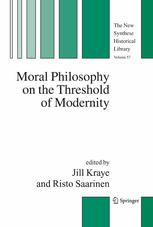 Today, we bring you a case of a serial plagiarizer.
Today, we bring you a case of a serial plagiarizer.
Martin W. F. Stone was a philosophy professor at the University of Leuven — by one account “widely admired and highly respected” — until 2010, when an investigation at the school concluded that his work is “highly questionable in terms of scientific integrity.” Over the past several years, he has racked up retractions, earning his 14th this spring, and spot #30 on our leaderboard.
Stone’s retractions were brought to our attention by philosopher Michael Dougherty, who found a notice for “Michael Baius (1513–89) and the Debate on ‘Pure Nature’: Grace and Moral Agency in Sixteenth-Century Scholasticism,” a chapter in Springer’s Moral Philosophy on the Threshold of Modernity.
The retraction notice says that the chapter
has been retracted at the request of the employer of the author at the time of writing, because it contains passages from the previously published manuscripts without acknowledging the source.
Dougherty is a co-author of “40 Cases of Plagiarism,” published in Bulletin de Philosophie Médiévale, which suggests most of Stone’s work is problematic. He told us that along with a few colleagues, he has been trying to have the Moral Philosophy paper retracted since 2011; we’ve reached out to the editors to see why it was retracted now. (Dougherty’s name might be familiar to our regular readers — he’s also helped instigate retractions for a communications researcher who has been investigated for plagiarism.)
Stone’s former workplace has distanced itself from his work. A 2010 Times Higher Education article quotes Peter Marynen, vice-president for research at Leuven:
The university no longer considers these publications as being part of its scientific output and retracts its affiliation with them. All publishers and editors of publications of Martin Stone with a K.U. Leuven affiliation have been formally informed.
A letter sent to publishers notes that Leuven’s Commission on Scientific Integrity concluded that Stone’s conduct is “highly questionable in terms of scientific integrity.” (More from that letter later in the post.)
Dougherty is credited for initiating a retraction from Tijdschrift voor Filosofie. Here’s the notice, dated 2010:
On December 17, 2009, the Editorial Board received an e-mail from Prof. dr. Michael V. Dougherty (Ohio Dominican University), in which he demonstrated that serious plagiarism had been committed in an article published by our journal several years ago. The article in question, ‘Truth, Deception, and Lies. Lessons from the Casuistical Tradition’ by M.W.F. Stone, appeared in Tijdschrift voor Filosofie 68/2006, pp. 101-131. Extensive passages in this article (i.e. pp. 114-127) are copied verbatim or nearly verbatim from: Johann P. Sommerville, ‘The “New Art of Lying”: Equivocation, Mental Reservation, and Casuistry’, in: Edmund Leites (Ed.), Conscience and Casuistry in Early Modern Europe, Cambridge, Cambridge University Press, 1988, pp. 159-84. Although in his article Stone makes reference to Sommerville’s publication, he in no way makes it clear that large sections have been copied verbatim from it. Moreover, Stone has copied and paraphrased passages from the works of several other authors without using quotation marks or making adequate reference to these publications.
The notice explains that Stone used to have a role at the journal:
This case of plagiarism is particularly embarrassing, since the author, M.W.F. Stone, was a member of the Editorial Board of Tijdschrifi voor Filosofie. Since the discovery of the plagiarism, Dr. Stone has resigned from his functions at the Katholieke Universiteit Leuven and has also been discharged from his duties on the Editorial Board.
Here are the other papers by Stone that have been retracted over the course of the past few years (we have included dates from the notices, when we could find them):
“Probabilism and Its Methods: Leonardus Lessius and His Contribution to the Development of Jesuit Casuistry” was published in 1999 in Ephemerides Theologicae Lovanienses, and pulled for plagiarism in 2010. “Such plagiarism represents a serious assault on intellectual integrity,” a notice from the editor explains. It doesn’t use the word “retraction,” but it does specify that
the electronic version of the article will no longer be made available by Peeters Publishers. Furthermore, self-adhesive labels will be despatched to subscribers together with fascicule 86/1 [2010] of ETL. Subscribers are invited to attach the labels to the first and last page of the offending article.
“The origins of probabilism in late scholastic thought: a prolegomenon to further study” was published in 2000 retracted in 2009 from Recherches de Théologie et Philosophie médiévales. The retraction notice explains that evidence of plagiarism is
overwhelming and irrefutable. Stone not only adopted the general structure of Kantola’s study [“Probability and Moral uncertainty in late medieval and early modern times” published by the Luther-Agricola-Society] and discussed the very same authors, but also copied numerous and extensive passages from Kantola’s book (mainly verbatim) without ever referring to Kantola and without having obtained permission to copy Kantola’s work. Apparently, only the brief introduction, some transitional paragraphs, and the short epilogue were not taken from Kantola’s book.
“The Angelic Doctor and the Stagirite: Thomas Aquinas and Contemporary ‘Aristotelian’ Ethics” was published in 2001 and retracted in 2011 from Proceedings of the Aristotelian Society. The retraction notice, which is paywalled — tsk tsk — explains,
The retraction has been agreed due to significant overlap with previously published material.
“Augustine and Medieval Philosophy” was published in The Cambridge Companion to Augustine, a Cambridge University Press book, in 2001. It has been removed, as this notice explains:
About 3/4 of the way through this post, “It notes that Leuven has resigned” surely should be “It notes that Stone has resigned”. Although no doubt Leuven has unhappily become resigned to Stone’s behavior.
fixed, thanks!
Plagiarism and the philosopher Stone: sounds like a good title!
Correct typo “intorduction” > “introduction” (printed correctly in Peeters’ original notice)
Fixed, thanks.